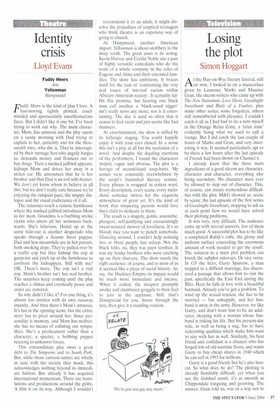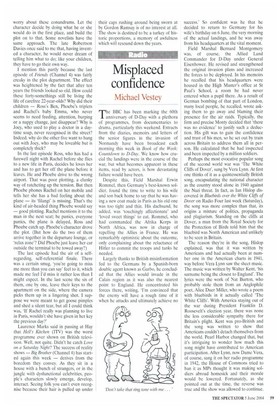Losing the plot
Simon Hoggart
A t the Hay-on-Wye literary festival, still .t-Von now, I looked in on a masterclass given by Laurence Marks and Maurice Gran, the sitcom writers who came up with The New Statesman, Love Hurts, Goodnight Sweetheart and Birds of a Feather, plus many other series, some forgotten, others still remembered with pleasure. I couldn't catch it all as I had had to do a turn myself in the Orange Relax Zone, a 'relax zone' evidently being what we used to call a lounge. But I did catch the last couple of hours of Marks and Gran, and very interesting it was. It seemed particularly apt to be there a few hours after the last episode of Friends had been shown on Channel 4.
I already knew that the three main ingredients of a good sitcom are character, character and character, everything else being secondary. No character must ever be allowed to step out of character. This, of course, can create tremendous difficulties with the plot. M&G showed us, scene by scene, the last episode of the first series of Goodnight Sweetheart, stopping to ask us at each point how we would have solved their plotting problems.
It was very, very difficult. The audience came up with several answers, few of them much good. A successful plot has to be like a completed Rubik's cube, the glossy and uniform surface concealing the enormous amount of work needed to get the result. The solution to a main plot problem can knock the subplot sideways. Or vice versa. In GS the hero, Garry Sparrow, a man trapped in a difficult marriage, has discovered a passage that allows him to visit the past, specifically the East End during the Blitz. Here he falls in love with a beautiful barmaid. Already you've got a problem. To wind up the sexual tension, she has to be married — but unhappily, and her husband is away in the army. However, we like Garry, and don't want him to be an adulterer, sleeping with a woman whose husband is risking his life. But his present-day wife, as well as being a nag, has to have redeeming qualities which make him want to stay with her as well. Similarly, his best friend and confidant is a chancer who has forged lots of old wartime fivers, and wants Garry to buy cheap shares in 1940 which he can sell in 1993 for millions, Garry is a good friend, but he's also honest. So what does he do? The plotting is already fiendishly difficult, yet when you see the finished result, it's as smooth as Chippendale tonguing and grooving. The answer. Gran told us, was in a way not to worry about these conundrums. Let the character decide by doing what he or she would do in the first place, and build the plot on to that. Some novelists have the same approach. The late Robertson Davies once said to me that, having invented a character, he would never dream of telling him what to do; like your children, they have to go their own way.
I mention this partly because the last episode of Friends (Channel 4) was fairly creaky in the plot department. The effect was heightened by the fact that after ten years the friends looked so old. How could these forty-somethings still be living the life of carefree 22-year-olds? Why did their children — Ross's Ben, Phoebe's triplets and Rachel's baby Emma, who never seems to need feeding, attention, burping or a nappy change, just disappear? Why is Joey, who used to play a doctor in a daytime soap, never recognised in the street? Indeed, why do the other five want to hang out with Joey, who may be loveable but is completely thick?
In the last episode Ross, who has had a farewell night with Rachel before she flies to a new life in Paris, decides he loves her and has to get her off the plane before it leaves. He and Phoebe drive to the wrong airport. That was poor plotting, a clunky way of ratcheting up the tension. But then Phoebe phones Rachel on her mobile and tells her she has a bad feeling about the plane — its `filangi' is missing. That's the kind of air-headed thing Phoebe would say — good plotting. Rachel mentions it to the man in the next seat; he panics, everyone panics, the plane is delayed, Ross and Phoebe catch up. Phoebe's character drove the plot. (But how do the two of them arrive together in the departure lounge, or 'relax zone'? Did Phoebe just leave her car outside the terminal to be towed away?) The last episode had the air of a selfregarding, self-referential finale, There was a certain smug, 'you're going to miss me more than you can say' feel to it, which made me feel I'd miss it rather less than I might expect. In the last scene the six of them, one by one, leave their keys to the apartment on the side, where the camera picks them up in a lingering shot. I suppose we were meant to get goose pimples and shed a silent tear, but all I could think was, 'If Rachel really was planning to live in Paris, wouldn't she have given in her key the previous day?'
Laurence Marks said in passing at Hay that Hell's Kitchen (ITV) was the worst programme ever shown on British television. Well, not quite. Didn't he catch Love on a Saturday Night? The success of reality shows — Big Brother (Channel 4) has started again this week — derives from the boredom they convey. As they sit in a house with a bunch of strangers, or in the jungle with dysfunctional celebrities, people's characters slowly emerge, develop, interact. Seeing folk you can't even recognise because their hair is pulled up under their caps rushing around being sworn at by Gordon Ramsay is of no interest at all. The show is destined to be a turkey of historic proportions, a memory of awfulness which will resound down the years.











































































 Previous page
Previous page